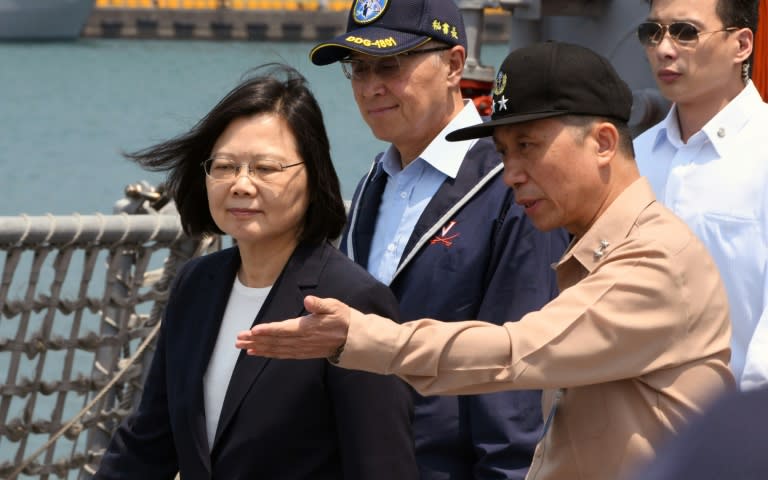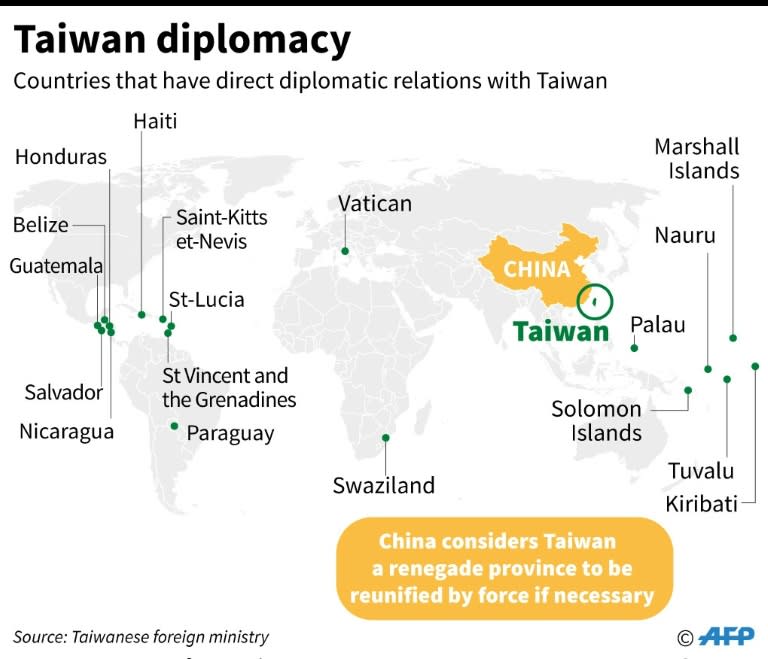Taiwan diplomacy harder than ever in US-China tug of war
Diplomacy has never been easy for Taiwan and is becoming ever more complex as it is caught between the United States under an unpredictable leader and an increasingly assertive China, which claims the self-ruling island as its own. In her strongest statement yet over pressure from China, Taiwan's president Tsai Ing-wen blamed Beijing after Burkina Faso severed ties Thursday with Taipei. Tsai said China was showing insecurity over "more substantial developments in relations between Taiwan and the US, and other like-minded countries". The US remains democratic Taiwan's most powerful ally and leading arms supplier, although it gave up official diplomatic ties in 1979 to recognise Beijing. In recent months, it has made a series of new overtures -- President Donald Trump signed a symbolic bill paving the way for mutual visits by high-level officials and Washington gave long-awaited approval for a licence necessary to sell submarine technology to Taiwan. Yet while Taiwan's relationship with the US is essential to its security, it must also guard against riling China, its biggest military threat but also the dominant market for the island's export-driven economy. Beijing officials have described ramped-up Chinese military drills near Taiwan as a warning against asserting its sovereignty. Analysts say they are also a message to Washington. Foreign minister Joseph Wu -- whose resignation over Burkina Faso was rejected by Tsai -- said earlier this month that furthering Taiwan-US relations must be done "in a very cautious manner". He described the government as seeking to "advance bilateral interests without creating any kind of trouble for anyone else". - New friends - While Taiwan calls itself a sovereign country, the island has never formally declared a split from the mainland and China sees reunification as its eventual goal. Since Tsai came to power two years ago, Beijing has become increasingly hostile and is highly suspicious of her traditionally pro-independence party. China is using its clout to shut Taiwan out of international meetings and to pressure companies to list the island as a Chinese province on their websites. To mitigate against Beijing's suppression, Taipei is making a concerted effort to win more international backing. Tsai is pursuing new business and cooperation with other nations, including through her "southbound policy", which targets 16 south and southeast Asian countries, as well as Australia and New Zealand. More countries than ever had voiced support for Taiwan after Beijing blocked it from a major meeting of the World Health Organization (WHO) earlier this month, said Tsai, who cast it as a sign the island was gaining global recognition. "Taiwan needs to form a broader coalition of willing friends to supplement the support it gets from the US," said Jonathan Sullivan, director of the China Policy Institute at Nottingham University, although he added the US remains the island's top foreign relations priority because of its influence. - Washington shift - Observers say growing frustration with Beijing has prompted the latest supportive gestures from the US towards Taiwan as trade tensions between the world's two largest economies escalate and concerns mount over China's assertiveness in the region. Relations with China are "no longer serving US interests", said William Stanton, who headed the American Institute in Taiwan (AIT) -- the US de-facto embassy in Taipei -- from 2009 to 2012. Arguably the most liberal place in Asia, Taiwan stands in stark contrast to Communist China's authoritarian one-party state and is a strategic Pacific ally for Washington to counter Beijing's territorial ambitions. All eyes will be on which US official is sent to the opening of AIT's newly built office complex next month, which cost $250 million. However, some observers point to Trump's erratic approach to foreign policy and fear Taiwan could be used as a pawn in his negotiations with China. "It may appear the situation in the US bodes well for Taiwan. But so far, we haven't seen what kind of benefits it is bringing us," said Teng Chung-chian, a diplomacy professor at Taipei's National Chengchi University. The US has not granted special trade protections to Taiwan, such as relief from steel and aluminium tariffs, he added. Any US support highlighting Taiwan's claim to sovereignty could also risk a "harsh response" from Beijing, said Kharis Templeman, a political scientist at Stanford University. But foreign minister Wu dismissed the possibility of Taiwan being used as a bargaining chip by the US, saying the island has "good friends" in the Trump administration. "Taiwan by itself is also an actor," he added. "We can also try to judge what is in Taiwan's best interest, and try to find the right policy for Taiwan."



